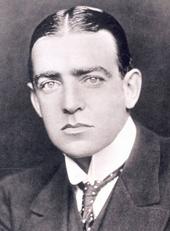"Sir Ernest Shackleton's name will for evermore be engraved with letters of fire in the history of Antarctic Exploration. Courage and willpower can make miracles. I know of no better example that what that man has accomplished."--Roald Amundsen, The South Pole
Sir Ernest Shackleton is probably best known for leading a thousand mile open boat journey across the treacherous Southern Ocean after losing his ship to the crushing ice floes of the Weddell Sea. The story of the Endurance is truly amazing, but there is much more to admire about Shackleton. Even before he attempted his Trans-Antarctic Journey, Shackleton was considered an Edwardian Hero. That is, until he got lost amid the hyperbolic zeitgeist of another man's death.
The trip that first brought Shackleton into the public eye was the Discovery expedition under the command of a neophyte explorer named Robert Falcon Scott. Scott, Shackleton and his best friend Dr. Edward Wilson made the one of the first outright bids for the pole from the Discovery's base in McMurdo Sound. Unfortunately, while all three men suffered from scurvy on that journey, Shackleton was the sickest. Scott, a navy man, had taken an instant dislike to Merchant Marine Officer Shackleton, and took this opportunity to have him invalided home rather harshly. To add insult to injury, Scott then exaggerated this episode in his account of the Discovery expedition. With Shackleton gone, "Bill" Wilson was now free to become Scott's best friend.
Once Scott published Voyage of the Discovery, his scathing assessment of Shackleton's so-called weakness during that trip (despite the fact that it was Scott's poor planning of the rations that was partly to blame for scurvy) made Shackleton feel deeply ashamed. Seething after Scott published his book, Shackleton immediately started planning his own expedition. He had quite a bit to prove. This began a heated rivalry bordering on hatred between Shackleton and Scott, which would manifest itself in both men's subsequent expeditions.
Shackleton's Nimrod expedition got him within 97 miles of the South Pole, man-hauling sledges weighing up to 200 pounds after their Manchurian ponies failed in the crevassed white desert of ice, and were shot for their meat. But because his calculations determined that if they went further, he and his team would starve, he turned back, saving his life and, more importantly, the lives of the men under his command.
Upon his return, he was said to have told his wife "I thought you would rather have a live donkey than a dead lion."
It takes a remarkable presence of mind to turn away from one's goal when so close. It shows true leadership, a quality that Shackleton showed again and again. Shackleton was confident, charismatic, charming and funny. He was also strinkingly good-looking, which we admit might play a small part in our admiration. But this is what also made him the perfect hero in 1909. Every one adored him.
It was a different story for Scott. Though lauded as a hero upon his return from the Discovery, Shackleton's Nimrod expedition quickly overshadowed his own, or so he thought. When Scott heard of Shackleton's plans, he even went so far as to require Shackleton to swear he would not use the base at McMurdo Sound, as Scott felt it was his and his alone. While Shackleton tried to live up to his word, the weather forced him to use Scott's base, and this further aggrivated Scott's hatred of Shackleton. When Scott made his final expedition South, it was Shackleton's accomplishments that Scott used as his benchmark. That fierce desire to go one better had a disasterous affect on the outcome of Terra Nova expedition. Scott evidently felt (and correctly, so it seems) that England would really prefer a dead lion.
Scott's death made him the quintessential English hero and Shackleton was permanently overshadowed, even after his heroic Endurance trip. Only recently have people begun to become interested again in "The Boss." We feel his record of leadership, ingenuity and fearlessness makes him a much better candidate for hero.
There is a story about Shackleton's early years in the merchant marine that Roland Huntford tells in his biography of Shackleton (titled, oddly enough, Shackleton) that further cements our high regard for him:
Hussey also told a story of how "one rather pompous skipper", who had heard Shackleton was "a bit of a poet" called to him when he was on the bridge keeping his watch "Is the glorious orb of day visible?" Like a flash Shackleton replied "The effulgence of King Sol is temporarily obscured by the nebulous condition of the intervening atmosphere." "Humph," said the skipper, who promptly retired.
There is much more about Shackleton to tell. Please give us time to continue our research. In the meantime, why not browse the library? It's aft, past The Boss' cabin. In fact, why not stop in and say 'hello.' He's a bit of a floating Gent.I edited my profile with Thomas Myspace Editor V4.4 (www.strikefile.com/myspace)
